The 20 Best Episodes of ‘Lost’
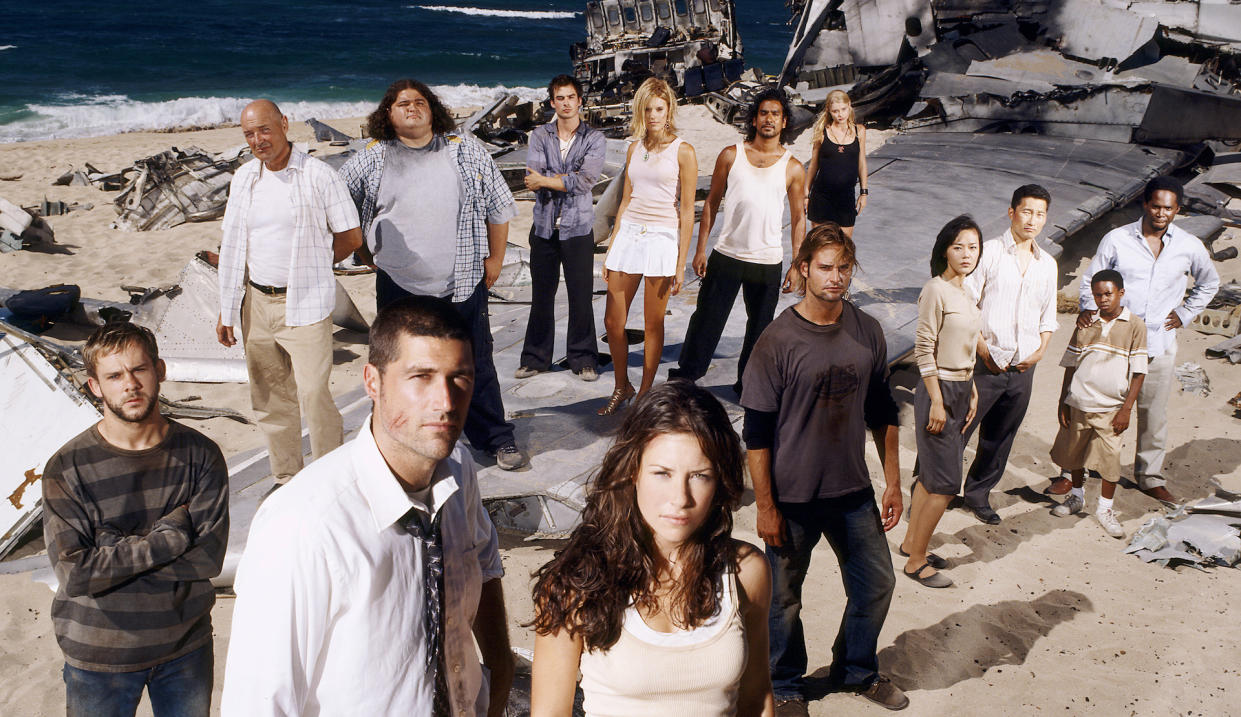
There are very few shows so cherished in the streaming era that they make headlines moving from one platform to another. It happened when “The Office” moved to Peacock, when “Friends” moved to Max (then HBO Max), when “New Girl” moved to Hulu — and it happened when “Lost” first left Netflix years ago, then made its triumphant return earlier this week.
The unforgettable plane crash drama created by J.J. Abrams, Damond Lindelof, and Jeffrey Lieber turns 20 later this year, and is still regarded as one of the most exceptional and important TV series of the century, if not all time. “Lost” was a masterclass in ensemble storytelling and high-end production in the pre-“Game of Thrones” world (for an emphatically non-“Game of Thrones” series). Even the polarizing finale is gaining defenders with the help of hindsight and nostalgia for how it fits into the seres’ bigger picture.
More from IndieWire
But as excellent as “Lost” is, it’s no fairy tale. In a 2023 feature for Vanity Fair that appears in “Burn It Down,” author Maureen Ryan revealed through interviews that actors, writers, and crew members on “Lost” often found it to be a hostile work environment, particularly for women and people of color. Lindelof claimed not to remember much of it — at the time, “Lost” was 17 years in the rearview — but upon hearing the allegations expressed his regret that anyone had had those experiences under his management and that he was part of a wider system in Hollywood that perpetuated bad behavior.
“The way that I conduct myself and the way that I treat other humans who I am responsible for and a manager of is a by-product of all the mistakes that were made,” he said. “I have significantly evolved and grown, and it shouldn’t have had to come at the cost and the trauma of people that I hurt on ‘Lost.’”
To that end, a lot of immensely talented people were part of the series, and revisiting “Lost” or choosing the best episodes is one of the ways in which we hope to highlight those figures in front of and behind the camera. For so much of its run, “Lost” was about how everyday people can be part of something extraordinary and serve a higher purpose, and we hope this list celebrates their work for doing just that.
Casey Cipriani contributed to this list from an archived post originally published on September 22, 2014.
20. “Not in Portland” (Season 3, Episode 7)
Along with a couple of notorious castaways, Season 3 introduced another series regular who would utterly captivate the hearts of “Lost” viewers: Juliet Burke (Elizabeth Mitchell). Juliet was a lethal mystery for six episodes (where’d she learn to snap a neck like that??) and then a grueling 13-week hiatus, but her origin story took the spotlight immediately after the break.
Before becoming an “Other,” Juliet was a fertility doctor in Miami, where her groundbreaking (and off-the-record) research got her recruited to a mysterious and promising work opportunity by one Richard Alpert (Nestor Carbonell). Instead of six months, she’s been on the island for three years, largely against her will and for which she blames Ben. There’s a lot of interpersonal drama among the Others in the island storyline, where Ben is still on the surgery table while Kate and Sawyer try to escape, but the backstory adds layers to Juliet with every scene, changing the entire context of her character by the time it ends (and earning her some goodwill for shared hatred of Ben and stopping the sadistic Danny from killing Sawyer). She’s still one of them, but clearly things are not as black-and-white as viewers thought. —PK
19. “The Other 48 Days” (Season 2, Episode 7)
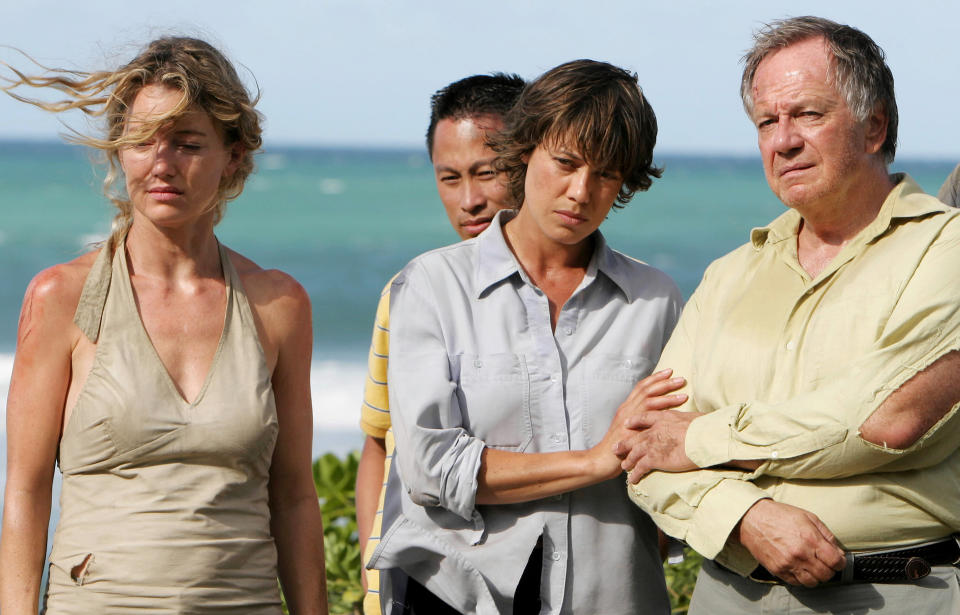
Whenever new characters began popping up on “Lost,” they were immediately scrutinized by both the characters within the show and the fans watching — Nikki (Kiele Sanchez) and Paulo (Rodrigo Santoro) proved that throwing new faces onto the island didn’t always work out so well. What “The Other 48 Days” did right was give the Tailies (those flying in the tail section of the plane, who crashed on a separate part of the island) their own backstory and enough encounters with The Others to earn the audience’s sympathy. By seeing how Ana Lucia (Michelle Rodriguez), Mr. Eko (Adewale Akinnuoye-Agbaje) and Bernard (Sam Anderson) experienced the crash and its aftermath, viewers were able to extend their concern and change their opinion from skeptical about these new arrivals, to caring about them. —CC
18. “Whatever Happened, Happened” (Season 5, Episode 11)
How did Benjamin Linus (Michael Emerson) become Benjamin Linus? Some would argue that being shot as a child has a way of changing a person. But did Ben become the vicious man that he was because Sayid (Naveen Andrews) shot him, creating the monster that was their arch villain? “Whatever Happened, Happened” explored the idea of destiny and whether or not all of their season five time travel was changing their future, or merely fulfilling what they’d already experienced. The episode also included a great flash-forward story for Kate (Evangeline Lilly), whose empathy for kid Ben was an immediate result of leaving Aaron behind to come back to the island. “Thirty years from now that boy’s going to be a man that locks me a cage because he needs surgery,” Jack (Matthew Fox) told her. “I’ve already done this. I’ve already saved Benjamin Linus, and I did it for you, Kate. I don’t need to do it again.” —CC
17. “Born to Run” (Season 1, Episode 22)
Kate’s character (Evangeline Lilly) takes some hits throughout “Lost” either as the writers lose steam or as a byproduct of being a woman often written by men, but “Born to Run” leans into the intrigue and humanity of our resident fugitive (before she was relegated to seeking therapy via love triangle). Flashbacks show a tender relationship between Kate and her childhood sweetheart Tom (Mackenzie Astin), melancholic as they reunite because she’s already on the run. Whatever Kate did, it’s not the car accident at the end that kills Tom, and it’s enough to make her dying mother (Beth Broderick) scream out for help when Kate is in the room. The island storyline unfolds in tandem like a crime procedural; Michael (Harold Perrineau) gets sick while expediting raft construction, leading the audience to suspect Sawyer (obvious suspect), then Kate (on the lam!), only to be the work of Sun (Yunjin Kim) but masterminded by Kate (genius!) — along with the reveal that Walt (Malcolm David Kelley) burned down the first raft because he doesn’t want to leave. Lots of tension in this group! —PK
16. “The Shape of Things to Come” (Season 4, Episode 9)
Let’s just point out that this episode earned Michael Emerson one of his handful of Emmy nominations for Best Supporting Actor. The plot revolved around the freighter crew making its way to the Others’ barracks, demanding that Ben Linus be released to them. Not only did Emerson put forth a damn fine performance, but the episode contains a ton of shocking moments: Keamy’s (Kevin Durand) brutal execution of Alex; the fact that Ben has the ability to “summon” the smoke monster and Ben’s declaration to Charles Widmore (Alan Dale) that to get even, Ben would now kill his daughter. Watch out, Penny! —CC
15. “Numbers” (Season 1, Episode 18)
Hurley (Jorgé Garcia) is the show’s de facto comic relief, but “Numbers” spotlight’s his effortless range as an actor through this flashback episode. It turns out that happy-go-lucky Hurley wasn’t lying about being worth millions, and that bad luck followed him everywhere after winning the lottery and he blames the numbers: 4, 8, 15, 16, 23, 42. His search for meaning about the numbers takes him to Australia (via brief sojourn at the in-patient facility he once lived in, an excellent nugget for future episodes) and ostensibly onto Flight 815, only for it to crash on the island — where he finds the numbers again, on Rousseau’s documents. Hurley tracks Rousseau down on the island, putting his life in danger from a character only depicted so far as disturbed and unpredictable, and they find the smallest comfort in each other by agreeing that the numbers are cursed, and they’re not crazy to think so. —PK
14. “Ab Aeterno” (Season 6, Episode 9)
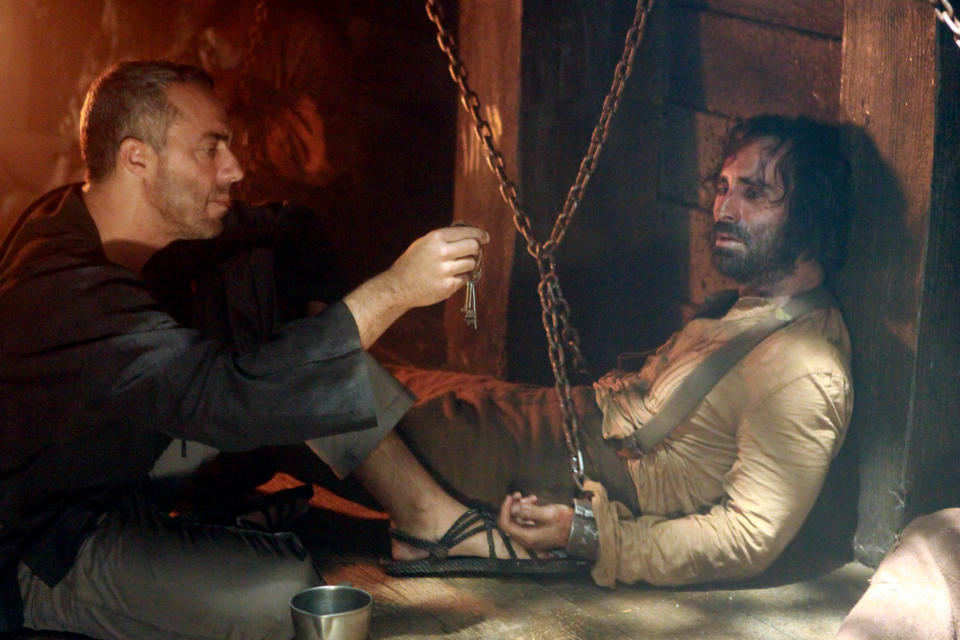
For six crazy seasons, audiences became more and more curious about Richard Alpert (Nestor Carbonell). Why didn’t he age? How did he appear in so many places? What was with the eyeliner!? In “Ab Aeterno,” we finally learned the truth. Alpert was brought to the island aboard the slave ship the Black Rock in 1867 after being found guilty of murder. He subsequently became a pawn in the battle between good and evil: Jacob (Mark Pellegrino) vs. the Man in Black (Titus Welliver). His waffling choices reflected the flaws in humanity on the whole, and showed that even our beloved Losties were minor players in a greater battle. —CC
13. “Lockdown” (Season 2, Episode 17)
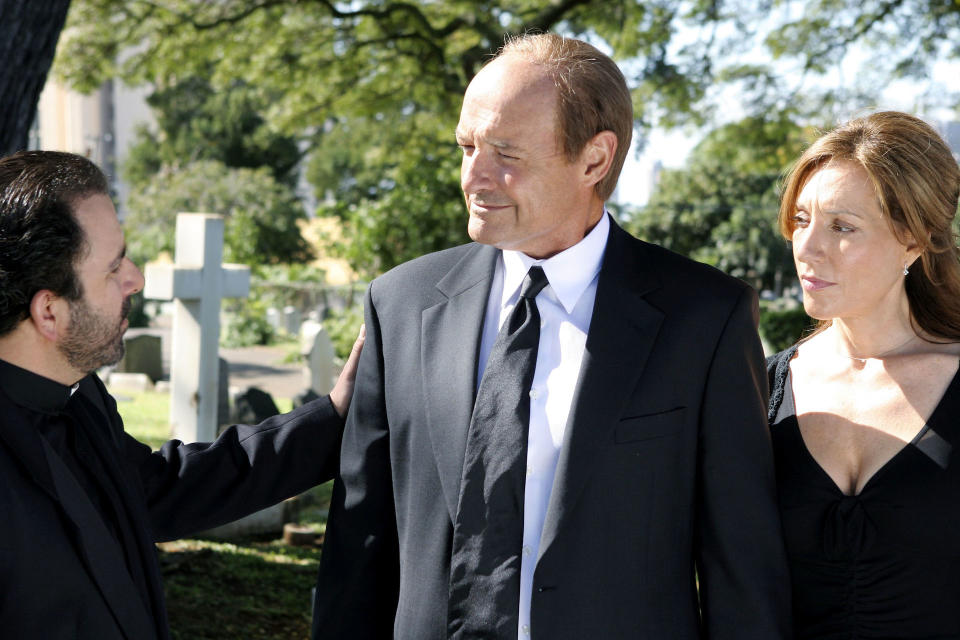
After his chilling monologue about luring the survivors into a trap, “Henry Gale” remains prisoner while Sayid (Naveen Andrews), Kate, and Hurley go to find his hot air balloon. Locke’s flashback reveals the depths of his daddy issues and the toxic dynamic that not only gave him lifelong trauma, but ruined his relationship with Helen (Katey Sagal). The computer system at the Hatch malfunctions, causing the metal doors to drop down in lockdown mode, and trapping Locke beneath one of them. With no one around except Henry, Locke begs for his help and promises to vouch for him, forming a bond during the vulnerable time they spend alone in this mysterious place (the Hatch, not the Island itself). Just when Locke starts to believe this man is exactly who he says, the search party returns — revealing that they found the balloon, but that Sayid dug up the grave next to it (sir?!), where he found a man named Henry Gale. —PK
12. “The Man Behind the Curtain” (Season 3, Episode 20)
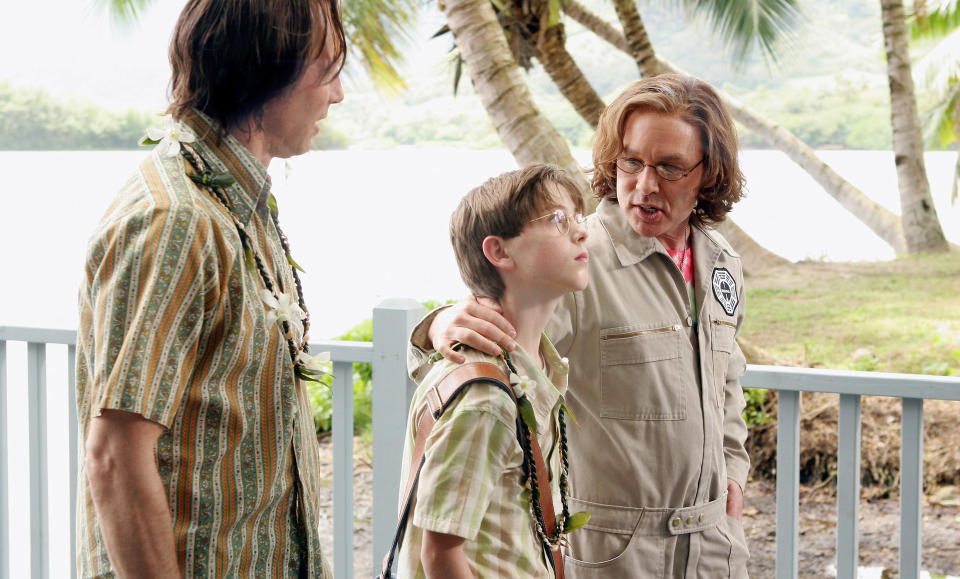
This far into Season 3, it was clear that Benjamin Linus was a devious and selfish man. What we didn’t know, until “The Man Behind the Curtain,” was just how far he was willing to go to come out on top. Some of the most shocking occurrences on “Lost” happened at his hands, and this episode was no exception. In an incident called “The Purge,” young Ben (who had until that point been officially a part of the Dharma Initiative) helped The Others kill every member of Dharma with poison gas. It was then, after gassing and abandoning his own father, that Ben finally became a part of The Others for good (or evil). —CC
11. “The 23rd Psalm” (Season 2, Episode 10)
In his first of two flashbacks, the writers and Akinnuoye-Agbaje demonstrate how Eko become such a beloved character so quickly, and despite little over a season on the show. As a boy, he’s forced into a life of crime to save his brother from the same fate, ending up on a dangerous path. Their relationship is never the same, but the story reveals that Eko still couldn’t save him, and that he became a priest by accident after losing Yemi (Adetokumboh M’Cormack). It also gives Akinnuoye-Agbaje plenty of scenes to chew the heck out of in both past and present. On the island, all this circles back to Locke and the plane that killed Boone (Ian Somerhalder), which turns out to house multiple decayed bodies, including Yemi’s. It’s a more overtly religious “Lost” episode than most — despite the arc of the series and Season 6 especially — but even then it feels spiritual and inclusive, with Eko using God and his life’s journey to make sense of the island. —PK
10. “There’s No Place Like Home” (Season 4, Episodes 12, 13, & 14)
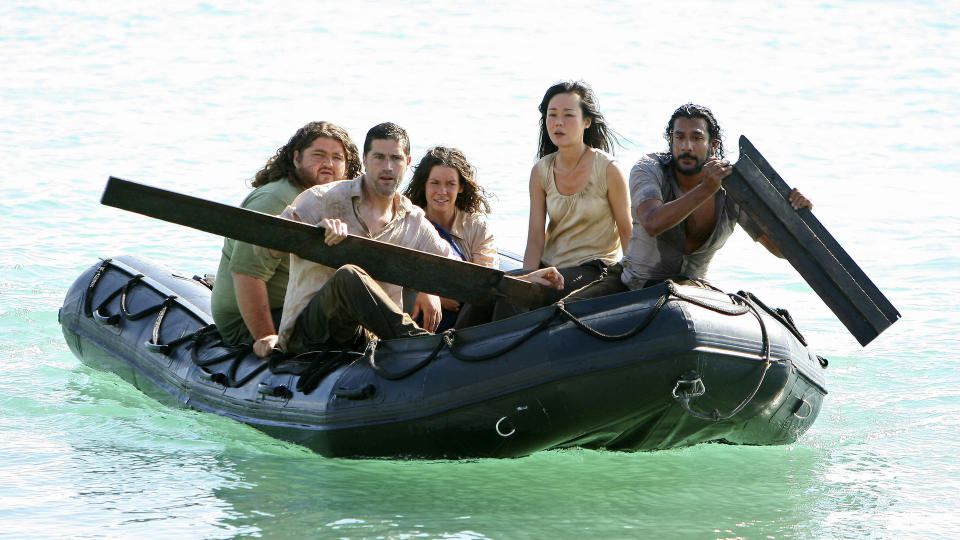
Forgive us the three-parter, but that’s just one of many ways in which this episode had no business going as hard as it did. “Lost” Season 4 was famously truncated by the 2007 Writers Guild of America strike, but the condensed episode run it yielded is utterly relentless and epitomized by these final hours. The flash forward picks up right after the Oceanic Six are rescued, with the menacing promise that what’s about to happen between then and now is going to be so awful that the survivors agree to never speak of it or the island — and a thrilling teaser: how do these six people end up together and safe, with everything currently happening on the island?
Jin (Daniel Dae Kim) and Michael (reunited!) try to neutralize Keamy’s (Kevin Durand) bomb as he pursues Ben and Locke, while Faraday and Lapidus (Jeff Fahey) devote their energies to saving as many castaways as possible via freighter ferry and helicopter. It’s hard to pick the most shocking and impactful moments from this run; the chopper losing fuel, Sawyer (Josh Holloway) jumping into the ocean, the freighter explosion (Sun’s screams!), the island disappearing, Desmond (Henry Ian Cusick) and Penny’s reunion(Sonya Walger) — to say nothing of the flash forward that brings us full circle to Season 3’s finale, a reminder further pain awaits those who escape and that somehow John Locke is going to end up dead in a coffin with the name Jeremy Bentham. —PK
9. “LaFleur” (Season 5, Episode 8)
An episode title that instantly had fans speculating, this one reveals its meaning within minutes and starts to set up the enormous stakes of Season 5. When the Dharma Initiative’s Horace (Doug Hutchison) is drunk at the security perimeter, his comrades alert LaFleur: Sawyer, firmly established in the community and head of security to boot. The episode goes on to reveal Miles (Ken Leung), Juliet, and Jin all living comfortably among the Initiative, building new lives and identities since the time flashes stopped in 1974.
But the biggest and best reveal is that Sawyer and Juliet, a pairing that barely shared screen time before this season, are now together and absolutely explode on screen. Holloway and Mitchell have beautiful chemistry, but what makes it so much better is how obviously good Sawyer and Juliet are for each other, in direct contrast with many other romantic interests on the show who care for each other but can’t make it work (hint: two of them just landed outside the perimeter!). Sawyer’s final closeup reveals his shock to see Jack, Kate, and Hurley back on the island, but also disappointment and terror; the brief peace is over, and life is about to get complicated once again. —PK
8. “Through the Looking Glass” (Season 3, Episodes 22 & 23)
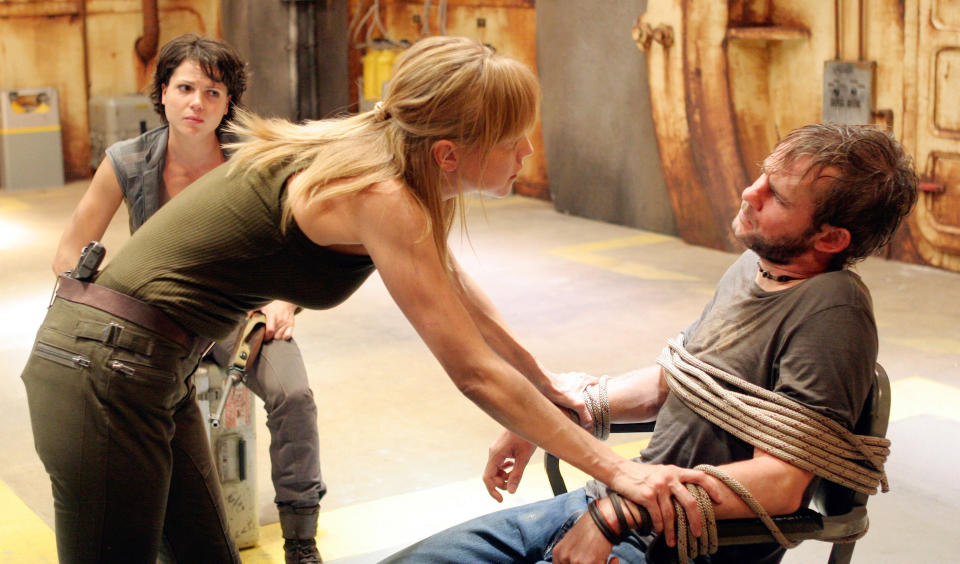
Two words: Flash forward. The Season 3 finale was a game changer. Just as audiences began to wonder how many more backstories we could sit through, “Lost” took its regular flashback formula and turned it on its head. The on-island story line had its great moments: Sawyer getting some much-anticipated revenge on Tom Friendly (M.C. Gainey); Charlie (Dominic Monaghan) finally making contact with Penny from the Looking Glass station; “Not Penny’s Boat.” But the closing scene’s reveal that Jack had been wallowing in drunken misery in the future, and that some of the castaways did, in fact, make it off the island, was a complete mind-fuck. From that point on, we didn’t know what was future and what was past, which made figuring out the show all the more exciting. —CC
7. “Do No Harm” (Season 1, Episode 20)

Jack’s episodes are some of the best when it comes to interweaving past and present, and “Do No Harm” is a master class right up there with “Through the Looking Glass” for juxtaposing (“jackstaposing”) the good doctor’s best and worst. On the island, Jack fights to treat Boone’s injuries after he was crushed by the plane, the island’s medical limitations at odds with his own hero complex. The flashback reveals at least part of where Jack got his saving-people-thing; from Sarah (Julie Bowen), the woman whose spinal column he once fixed after others though she’d never walk again. In the jungle, Claire (Emilie De Ravin) goes into labor, creating a perfect cocktail of island chaos intercut with some of the most happy, peaceful days of Jack’s life as he weds Sarah. The episode wastes not one second of its real estate, from a stress-filled cold open to an appearance from Christian Shepherd (John Terry) to Claire’s fear that the baby won’t want her. It also ends with the first appearance of “Life and Death,” which would become the series ode to the fallen for years to come. —PK
6. “The End” (Season 6, Episodes 17 & 18)
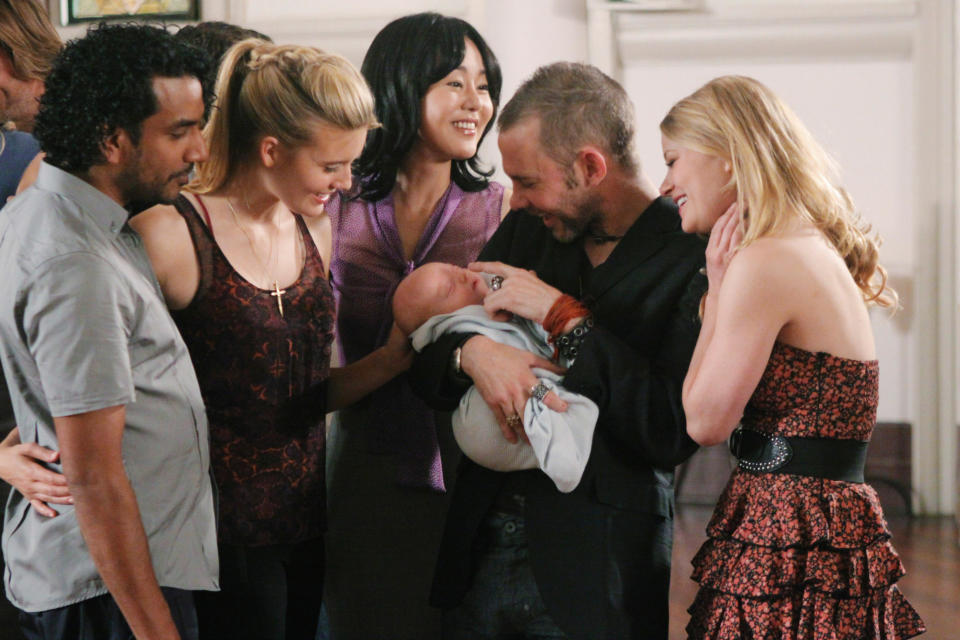
The series finale of “Lost” was one of the most polarizing conclusions in television history. While some expressed anger over the two-and-a-half-hour episode not answering every single mysterious question the show posed, others found it to be a lovely finale that touched on many of the series’ grander themes. This writer falls firmly in the latter category. While the action of good vs. evil raged on the island, the more universal ideas of love and life and death were being addressed in the sideways world. For a show that always strived to be about people rather than plot, it was a powerful finish. Who didn’t bawl their eyes out when Vincent the dog came to comfort Jack in his final moments? And for those of you who didn’t get it: No, they were not dead the whole time. (Just some of it.) —CC
5. “Greatest Hits” (Season 3, Episode 21)
When Charlie found out that his band, Drive Shaft, released an incredibly successful Greatest Hits album right after the crash of Oceanic 815, he created a list of his own “Greatest Hits”: a timeline of his best moments. With Desmond’s precognitive abilities predicting Charlie’s inevitable death, and the public knowledge that Monaghan was leaving the show, everyone knew what was coming, and this episode was a proper goodbye. Charlie’s “Greatest Hits” wasn’t just an homage to the beloved character, but also to the actor who embodied him for three seasons. —CC
4. “Man of Science, Man of Faith” (Season 2, Episode 1)
Before we got to the epic head-to-head that was Jacob vs. the Man in Black, the original battle for island domination was between Jack and Locke. In the Season 2 premiere, their differences finally hit their breaking points, but while science and faith butted heads, we more importantly got to meet the man who became one of the most beloved characters of the series: Desmond Hume. The opening sequence of “Man of Science, Man of Faith” was like nothing we had yet seen on “Lost,” and like many premieres after it, would challenge our expectations and change the show’s dynamic entirely. —CC
3. ”Walkabout” (Season 1, Episode 4)
After the nail-biting pilot and a semi-bland Kate flashback episode, “Walkabout” is what got fans hooked on “Lost” for good. It was the episode that showed what kind of drama the series was capable of, and there was no going back. In a brilliant bait-and-switch script from “Buffy the Vampire Slayer” scribe David Fury (who justly earned an Emmy nomination for the episode), the John Locke on the island and John Locke of his flashbacks are seemingly two different people. Off-island Locke was a low-level box company employee who played nerdy games on his lunch break. Island Locke kills wild boars with a briefcase full of hunting knives. The final reveal that pre-island Locke was wheelchair-bound told the audience that everything we thought we knew about these people or this show was wrong, and that’s how it was going to be for the rest of the run.
It’s also profoundly emotional, with Locke’s desperate argument with the Australian walkabout tour guide juxtaposed against his opening scenes in the pilot and putting the viewer right in his shoes (or socks, when he wiggles his toes in disbelief). While the horror and chaos of the plane crash surround him, Locke experiences one of the most miraculous moments of his life. For Locke, the island wasn’t a problem; it was his salvation, his second chance. —CC
2. “The Constant” (Season 4, Episode 5)
Remember five minutes ago when I said that Desmond Hume became one of the most beloved characters of the series? Add the love of his life, Penny Widmore, to the story and you can multiply that by a million. These two were meant to be together, but tragically torn apart. And when Desmond’s consciousness became lost in time, his mind jumping back and forth between years, the only thing that could ground him again was Penny, his Constant. In one of Desmond’s flashes in time, he asks Penny to never change her phone number, so that one day in the future, should he need her, he’d be able to find her. Forget Jack and Kate or Sawyer and Juliet. The real love story on “Lost” belonged to Des and Pen. —CC
1. “Pilot” (Season 1, Episodes 1 & 2)
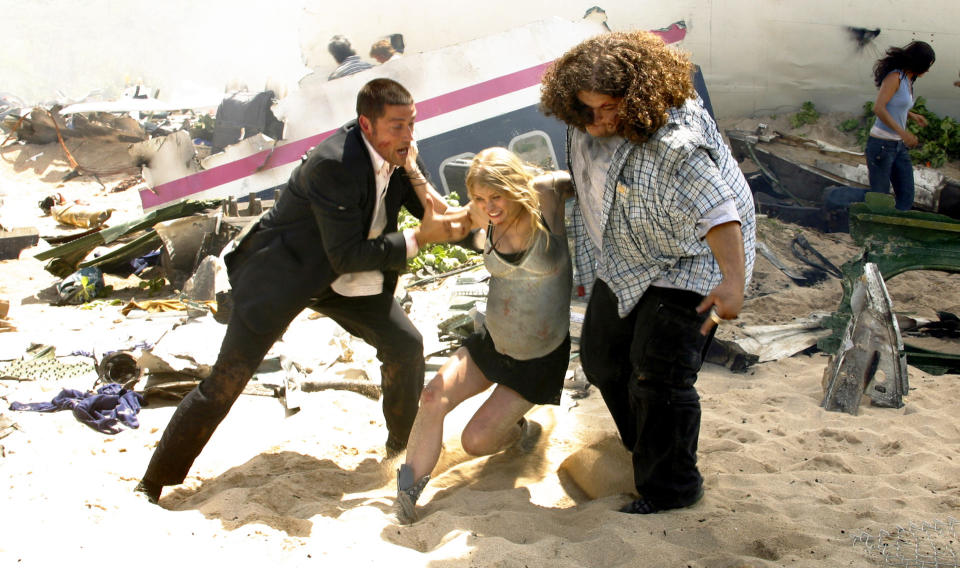
The purpose of a successful pilot is to set up a show’s premise and introduce the key players that will be a part of the story, all while including the potential ambiance and expectations of the series to come. The pilot of “Lost” did all of that and more, prompting TV Guide to rank it fifth on its 100 Greatest Episodes of Television of All Time. Indeed, the “Lost” pilot is one of the best in history, and made audiences chomp at the bit to learn more about the island and its ragtag bunch of survivors. While many pilots struggle to establish a handful of new faces, “Lost” managed to tackle the introduction of 15-plus characters. It also made television look downright cinematic — it was nothing like what we’d seen or heard on TV before — and then we were hooked by Charlie’s final question: “Guys, where are we?” —CC
“Lost” is now streaming on Netflix.
Best of IndieWire
The 30 Best Nude Scenes in Film, from 'Shortbus' to 'Blue Velvet' to 'No Hard Feelings'
The 15 Best Thrillers Streaming on Netflix in July, from 'Fair Play' to 'Emily the Criminal'
Sign up for Indiewire's Newsletter. For the latest news, follow us on Facebook, Twitter, and Instagram.


